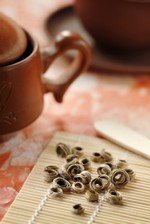Solving problems every tea drinker faces.
Exclusive subscriber benefits:
Receive four FREE quality ebooks worth $60
-
Save at least $5 during your first purchase

Many scientific research studies have shown that green tea fights bacteria, inflammation and reduces stress. Perhaps it would be an excellent candidate for treating acne?
For a long time, scientists thought that damaged brain cells were irreparable.
Feeding green tea extract to mice with Parkinson's and Alzheimer's disease protects brain cells from dying and even reverses the damage. This was found in a 2007 study conducted by Dr. Silvia Mandel of Technion Institute of Science in Israel.
A further 2017 study conducted by McMaster University found that green tea can prevent Alzheimer disease by blocking the formation of harmful plaques in the brain.
We report these studies in reverse chronological order.
2017 Study by McMaster University, Ontario, Canada
Researchers found that the green tea polyphenol epigallocatechin gallate (EGCG) stops the formation of beta-amyloid plaques.
The precise causes of Alzheimer's disease remain unclear, but it is believed that beta-amyloid plays a key role. This "sticky" protein can clump together, forming plaques that disrupt communication between nerve cells.
The researchers came to their findings by using nuclear magnetic resonance to get an in-depth look at how EGCG might affect the formation these plaques. The team explains that beta-amyloid monomers — which are tiny binding molecules — form beta-amyloid oligomers. Over time, these oligomers can stick together and form toxic beta-amyloid plaques.
In their analysis, Melacini and colleagues found that EGCG "remodels" beta-amyloid oligomers, which stops them from creating harmful plaques.
"At the molecular level," explains Melacini, "we believe EGCG coats toxic oligomers and changes their ability to grow and interact with healthy cells." These findings not only support previous studies suggesting that EGCG can help to prevent beta-amyloid plaque formation, but they also shed light on the mechanisms underlying this association.
We all know that currently there is no cure for Alzheimer's once symptoms emerge, so our best hope is early intervention. That could mean using green tea extracts or their derivatives early on, say 15 to 25 years before any symptoms ever set in." Giuseppe Melacini
The team notes, however, that it is difficult to deliver EGCG directly to the brain, so future research will need to focus on finding ways to modify the compound and overcome this problem.
2007 Study by Technion Institute of Science, Isreal
Tea consumption is inversely correlated with the incidence of dementia, Alzheimer's disease and Parkinson's disease. Tea drinking Asians are less likely to suffer from age-related neurological disorders compared to Europeans and Americans.
But until now, nobody knew how green tea antioxidant – EGCG – works when it gets into the brain.
The green tea and Alzheimer's study conducted by Mandel solved the puzzle.
Dr. Mandel fed green tea extract, equal to 2 to 4 cups a day, to mice induced with Parkinson's disease. She found that EGCG prevented brain cells from dying, and reduced compounds that lead to lesions in the brain.
She presented her findings in Washington DC to a rapt audience of colleagues at the Fourth International Scientific Symposium on Tea and Human Health.
"It was received really well, and I was told there was extreme interest in it," said Mandel.
"More recently, a PhD student of mine - Lydia Reznichenko - conducted a "neurorescue" study that closely resembles what happens in humans - first the disease is diagnosed and then the doctors prescribe medication," said Mandel.
"We induced Parkinson's in mice and waited until the damage was evident. Then we began to administer the EGCG to the animals. The results showed that the EGCG not only prevented further deterioration, but it helped to regenerate the already damaged neurons in the brain.”
“This phenomenon is called neurorescue or neurorestoration, and we're the first to show that green tea is effective in doing this.”
“The major question is whether these promising results are reproducible in humans."
Exciting Breakthrough
"Researchers have been actively searching for better ways to support brain cell repair for many years," said tea and health expert Dr. Carol Greenwood.
"This finding that tea, a natural product consumed by millions of people every day, can help repair them is especially exciting."
The years of green tea and Alzheimer's research are beginning to pay off.
The Michael J. Fox Foundation is conducting tests in China on early Parkinson's patients to check whether green tea extract is slowing down the progression of the disease.
Mandel is so impressed by the healthful properties in tea that she drinks 4 cups a day.
"I try to drink at least 2 cups of green tea a day. And I like regular dark tea too, so I drink another 2 cups of that."
New! Comments: Like This Story? Leave A Comment!
References
Rashik Ahmed, Bryan VanSchouwen, Naeimeh Jafari, Xiaodan Ni, Joaquin Ortega, and Giuseppe Melacini (2017). Molecular Mechanism for the (−)-Epigallocatechin Gallate-Induced Toxic to Nontoxic Remodeling of Aβ Oligomers. J. Am. Chem. Soc., 2017, 139 (39), pp 13720–13734.
David Brinn (2007). Israeli researchers show that green tea has rejuvenating
effect on damaged brain cells. http://www.israel21c.org/bin/en.jsp?enDispWho=Articles%5El1805&enPage=BlankPage&enDisplay=
view&enDispWhat=object&enVersion=0&enZone=Health
Related Articles
Tea contains theanine and caffeine.Both compounds synergise to improve concentration. A study found just 4 cups of tea will achieve the profound effect.
Back to Top of Green Tea And Alzheimer's
Back to Green Tea Benefits Main Page
Back to Tea Health Benefits Main Page
Back to Amazing Green Tea Home
Solving problems every tea drinker faces.
Exclusive subscriber benefits:
Receive four FREE quality ebooks worth $60
Save at least $5 during your first purchase
Copyright� 2006-2025 Amazing-Green-Tea.com. All rights reserved.

